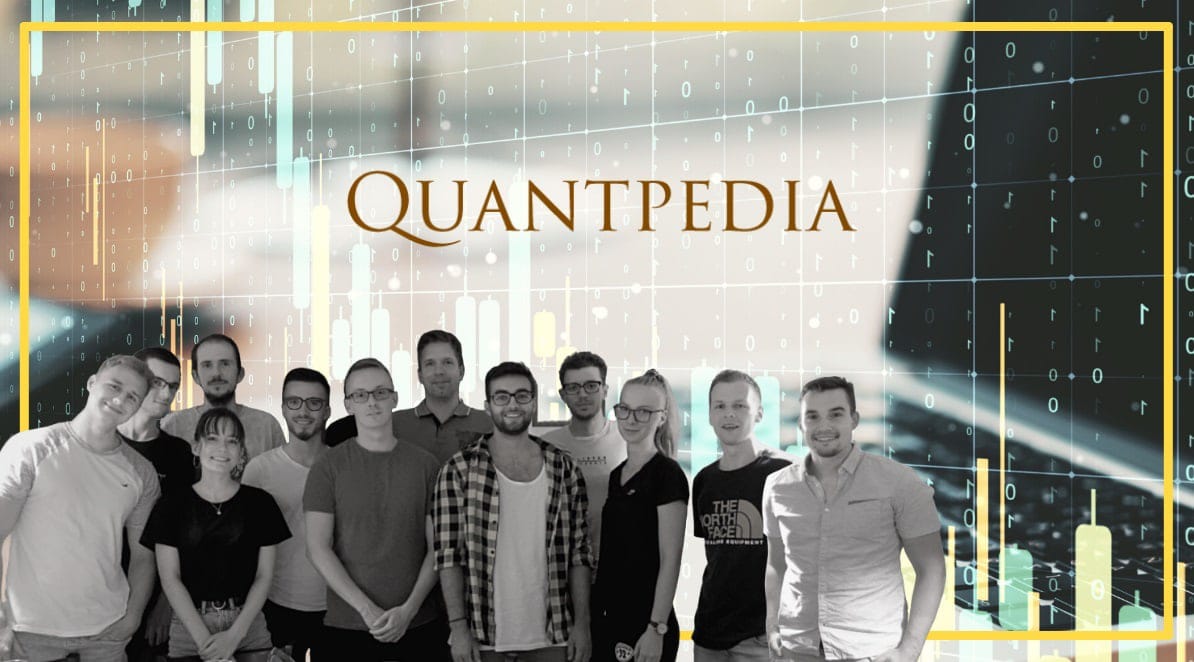Many things have changed in 2021 for both investors and portfolio managers. The increased availability of large amounts of data related to capital markets has continued to create challenges for investors. One of the firms trying to help portfolio managers better navigate all this data is QuantPedia.
Whilst topics surrounding the challenges of cloud computing and cybersecurity are at the forefront of the minds of the typical CTO in financial services. Most investment banks have had record profits, some of them are even looking to increase the bonus pool for staff by up to 50% on last year.
This year we have witnessed the power of the Reddit Trader, the collapse of Greensill and Archegos, finally followed by the devastating fall of Evergrande. At the same time cryptocurrencies and the ongoing climate emergency have also had huge impacts on how investors trade.
To help hedge funds, family offices and asset managers better navigate what can only be described as a dramatically changing investment landscape, more and more data needs to be analysed. Better models need to be created and many strategies completely re-thought.
The benchmark U.S. stocks index has closed at a record high more than 60 times this year. Coupled with the spectre of inflation staying high for longer than predicted, 2022 doesn’t look any easier to navigate than 2021 was.
The benchmark U.S. stocks index has closed at a record high more than 60 times this year.
— #DisruptionBanking (@DisruptionBank) December 19, 2021
Even the optimists acknowledge risks in this rosy outlook. https://t.co/lCkB6Pospr
To help better understand some of the challenges that portfolio managers face, #DisruptionBanking spoke with Radovan Vojtko, Founder and CEO of QuantPedia.
QuantPedia – an Encyclopaedia of Algorithmic & Quantitative Strategies
Whilst working at Tatra Asset Management as a Portfolio Manager, Radovan was focused on looking for ideas to build good models. For ways to include them into the portfolio, because funds are multi-asset, multi-strategy portfolios.
To help him build better models, Radovan started to look at academic research. He started to take notes about the research he found, and that is how QuantPedia was born.
Today, the firm has around 400 clients.
“5 years ago, 80% of our customers were from Europe and the U.S., and only 20% were from Asia. Today, 40% of our customers are from Asia,” Radovan shared. “Our customers come equally from amongst professional investors as well as from high-net-worth individuals.”
Radovan explained what QuantPedia does as “building a bridge between academia and between portfolio managers who are always looking for new ideas with which to improve their portfolio.”
“When you are a portfolio manager, most people think that most of the time you are building models, looking for markets and predicting where prices will go and so on,” Radovan suggested.
“But it’s not true,” he argued. “80% of the time you are reporting, To your boss, to your client. You are attending conferences, meetings, writing emails, etc… It’s only 20% of the time that you are able to model, download data to analyse, look for alpha strategies or read academic research.”
Radovan suggests that the “useful stuff” is given only up to 10 hours a week, which means portfolio managers need better and more quickly available data and access to strategies.
Which is where QuantPedia comes in.
“QuantPedia Pro and QuantPedia Premium are the two main areas where QuantPedia can help,” Radovan explained. “QuantPedia Premium is access to the database of ideas”
Radovan argued that QuantPedia Premium is a “warehouse” of models that investors use as a database of ideas. Currently crypto strategies, for instance, are a hot area that customers are asking for more ideas about, he explained. There is currently 600+ of these strategies listed on the platform based on academic research, with links, sources accredited and back-tests that can be used.
“QuantPedia Pro is bought only by professionals,” Radovan explained further. QuantPedia Pro is a platform where you can test multi-asset, multi-strategy portfolios. “You can test optimisation. You can test CPPI, risk parity, and so on. QuantPedia Pro will help you to go through the quantitative research process faster.” Then you can take the model and test it in your own environment, Radovan added.
“Customers all use different technical environments for back-testing. C++, Python, R, Matlab, and a whole host of other solutions,” Radovan explained. Without QuantPedia Pro, customers would have to implement models into their own solutions first. And only later find out if they made sense or not for their portfolio. “QuantPedia Pro is for exploration. You can explore ideas for new strategies faster.” He concluded.
The Methodology behind QuantPedia’s Research
There are thousands of new papers published each year, across the world, about algorithmic or quantitative trading strategies. #DisruptionBanking raised the question with Radovan about what criteria QuantPedia used in order to filter the papers.
“The first thing is that there must be complete methodology in the paper,” Radovan explained. Ideally, he looks for something insightful and new in the paper, otherwise it may simply be a replica of someone else’s work. Radovan used an example research paper about momentum during our discussion:
The most cited paper on Momentum Investing is perhaps the 1993 paper by Jegadeesh & Titman titled 'Returns to Buying Winners & Selling Losers: Implications for Stock Market Efficiency.'
— Deepak Venkatesh (@deepakvenkatesh) June 1, 2020
If you are interested in reading it here is the link for it. https://t.co/7fKigfC0nk
The first paper on momentum by Jegadeesh & Titman was published in 1993. Radovan shared how hundreds of papers have been written on the subject since. Related to specific events or nations, for example. He explained how QuantPedia would only write independent research about one of these newer papers if it offered something new as well as interesting.
The team at QuantPedia use keywords and have access to portals where research papers are regularly published. Working through a grading system, the team puts together the most interesting new ideas for users of QuantPedia Premium.
How Portfolio Managers use QuantPedia’s ‘database of ideas’
Radovan commented on how customers from the Asia-Pacific region are turning to QuantPedia in ever larger numbers. “Our customers mainly use QuantPedia as an input for their own models,” he added. “Once they find an idea in QuantPedia, they can test the idea. They can change the data set, or change the timeframe, for instance.”
“What we recommend is that they take the idea for a model and use it for a completely different asset class. They can take an idea from futures and implement it on equities,” Radovan shared. “90% of customers are using QuantPedia as a database of ideas. Our customers want us to dig deeper and find more ideas.”
“My responsibility is to give my customer the platform which will help them to correctly understand what’s useful for them and find good ideas.” The implementation part is then up to the individual portfolio managers themselves, Radovan added.
The platform also serves as a training platform for those still learning about the industry, Radovan shared. Or for portfolio managers who want to explore other strategies which might refer to funds they haven’t normally been involved with like commodities.
Global Trends affecting Portfolio Managers
Much academic literature is about how machine learning and artificial intelligence is being used in trading strategies. For Radovan though, the biggest trend right now is alternative data sets. He explained how “alternative data sets are very closely related to machine learning.”
“So, machine learning was very interesting a few years ago. Researchers tried to use machine learning for usual price-based and fundamental data sets.” Radovan went on to explain why he thought that machine learning is not suitable for these data sets, mainly because they are so well researched today. “It’s not a very high possibility that by using machine learning on existing price-based and fundamental data sets, that you will be able to find something completely new.”
Six Examples of Trading Strategies that Use Alternative Datahttps://t.co/29k9WYWfrf pic.twitter.com/SvAyrhNgwR
— Radovan Vojtko – CEO of Quantpedia.com (@quantpedia) October 26, 2021
“Alternative data sets are growing fast. And machine learning is very useful for alternative data sets.” Radovan shared. Using quarterly CEO reports as an example, he showed how machine learning can be useful for following companies by learning and reading what the CEO says in the quarterly report. Where machine learning can do this with ease, it now needs to be “combined with the alternative data set,” Radovan concluded.
Radovan believes that ESG is a big part of alternative data sets. “It’s a big part, because it’s a strong trend, and I agree with it,” he added. “Everybody tries to use the ESG label. Whether ESG actually enhances performance is open to discussion.”
The future for QuantPedia
QuantPedia’s growth is a priority for Radovan. Growth not just in size, but in the services being offered to customers. He explained how looking to academic research for ideas was fine, but that there were other ways to find inspiration for a “white box strategy” too.
By “white box strategy,” he meant the strategy which defines a good, complete methodology.
“Before 2008 everyone was using a black box strategy [or a secretive strategy]. After 2008 and the global financial crisis, people realised that it’s good to have some transparency. Many of today’s providers transparently show how their index is based.” Radovan explained. “And the rules must be transparent.”
“We are looking at ways to integrate all the offerings on one platform. To give our customers the possibility to see or compare other valuations of the same thing from other providers. How they took the idea and how it performed over time. To help make better decisions.” Radovan added that this platform-based solution would form part of QuantPedia Pro. Ultimately helping customers with more reporting, better methodologies for rating, new methodologies for rating and risk measurement, for contribution and attribution analysis and more.
With the challenges that abound in 2022, companies like QuantPedia will undoubtedly continue to grow both in numbers of customers as well as the services offered. Especially in the Asia Pacific region. Just as 2008 caused a shift in the way many investors trade today, so the Pandemic continues to change how markets perform.
Find out more about alternative data sets by following QuantPedia on Twitter. For the most important events affecting the industry, check QuantConferences regularly too.
Authors: Curran Snell and Andy Samu
#GlobalTrends #Methodology #AlphaStrategies #QuantPedia #PortfolioManager #AssetManager #FamilyOffice #HedgeFund #Momentum #AlgorithmicTrading #QuantitativeTrading #Exploration #DatabaseIdeas #FundStrategy #FundModel #DataSet















